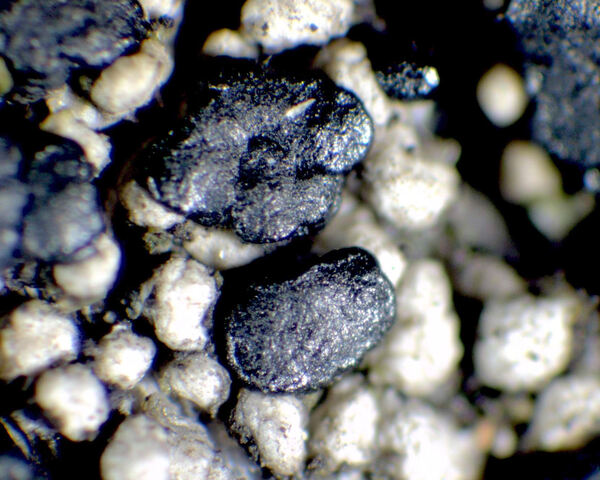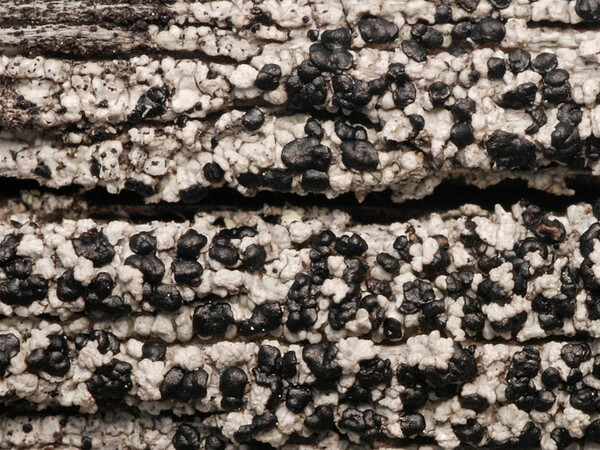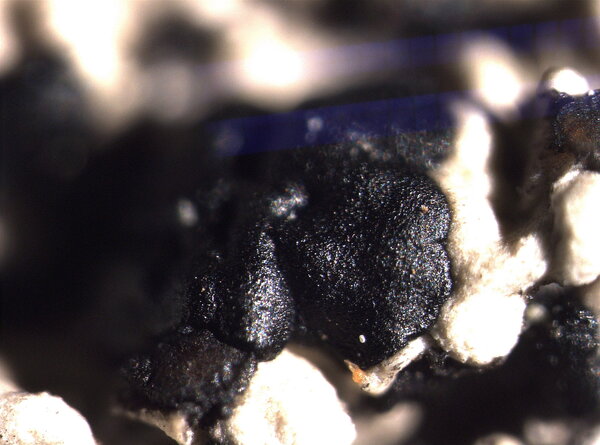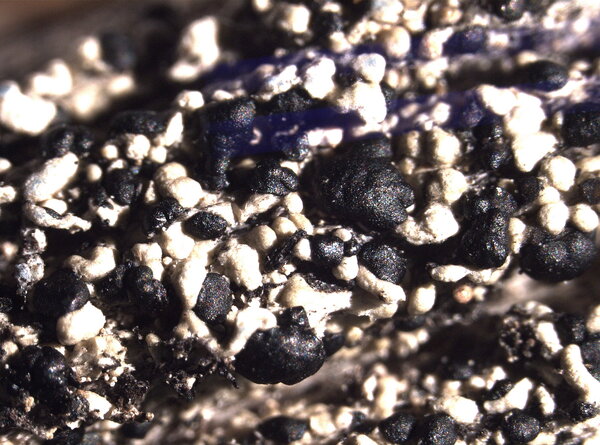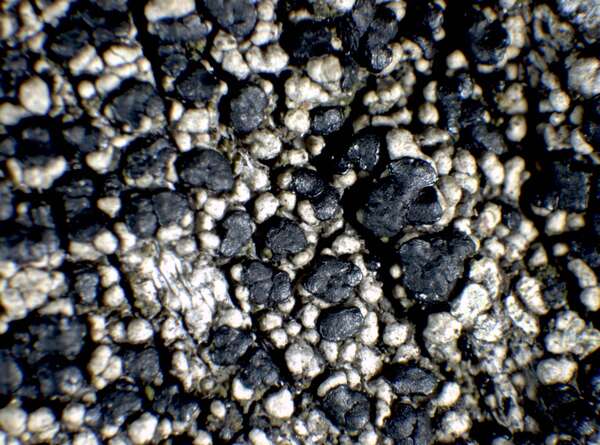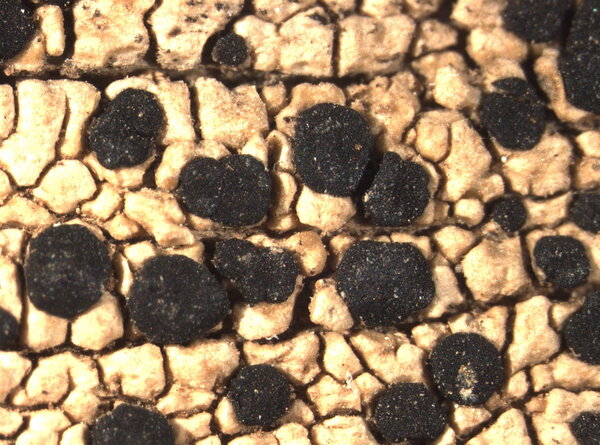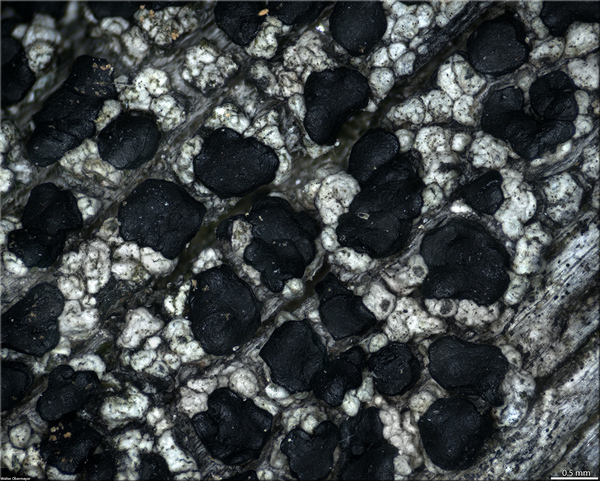Ramboldia elabens (Fr.) Kantvilas & Elix
Lichenologist, 38: 139, 2007. Basionym: Lecidea elabens Fr. - Vet. Akad. Handl.: 256, 1822.
Synonyms: Lecidea enteroleuca f. microcarpa Jatta; Lecidea melancheima Tuck.; Lecidea sabuletorum var. microspora A. Massal.?; Pyrrhospora elabens (Fr.) Hafellner
Description: Thallus crustose, episubstratic, white to glaucous grey, of contiguous or rarely dispersed, convex, 0.2-0.5(-0.8) mm wide areoles, usually without a distinct prothallus. Apothecia lecideine/biatorine, black, 0.3-1.2 mm across, not or only slightly constricted at base, with a glossy, flat to convex disc, and a shiny, usually thin and inconspicuous, not prominent, finally usually excluded proper margin. Proper exciple prosoplectenchymatous, of radiating, branched and anastomosing hyphae, purple-black and K+ olive-brown in outer part, paler or colourless within, of thin, radiating, gelatinized, elongated, 1.5-2 µm thick hyphae; epithecium dark olivaceous to red-brown or brown-black, K+ olive-brown, N+ red; hymenium colourless, c. 60 µm high, I+ blue turning wine-red; paraphyses strongly coherent, simple or sparingly branched and anastomosing in upper part, the apical cells clavate, 4-5 µm wide; hypothecium colourless to pale yellow-brown in lower part, with anticlinally arranged hyphae, K-, N-. Asci 8-spored, clavate, the tholus with a strongly amyloid lateral part, a non-amyloid broadly diverging axial mass with a thick, non-amyloid cap above, and a weakly amyloid outer layer Lecanora-type. Ascospores 1-celled, hyaline, narrowly ellipsoid to ellipsoid, 8-10(-12) x 3-4 µm, pointed at ends. Pycnidia dark, immersed. Conidia filiform, curved, 11-35 µm long. Spot tests: thallus K+ pale yellow, C-, KC-, P+ golden yellow to orange-red or P-, UV-. Chemistry: thallus with atranorin (major), fumarprotocetraric acid (major) chloroatranorin (minor), protocetraric acid (minor), confumarprotocetraric acid (minor), succinprotocetraric acid (trace), and an unknown depside (minor).
Growth form: Crustose
Substrata: lignum
Photobiont: green algae other than Trentepohlia
Reproductive strategy: mainly sexual
Commonnes-rarity: (info)
Alpine belt: absent
Subalpine belt: very rare
Montane belt: extremely rare
Dry submediterranean belt: absent
Humid submediterranean belt: absent
Padanian area: absent
pH of the substrata:
1 2 3 4 5
Solar irradiation:
1 2 3 4 5
Aridity:
1 2 3 4 5
Eutrophication:
1 2 3 4 5
Poleotolerance:
0 1 2 3
Altitudinal distribution:
1 2 3 4 5 6
Rarity
absent
extremely rare
very rare
rare
rather rare
rather common
common
very common
extremely common
Loading data...
Occurrence data
Predictive map
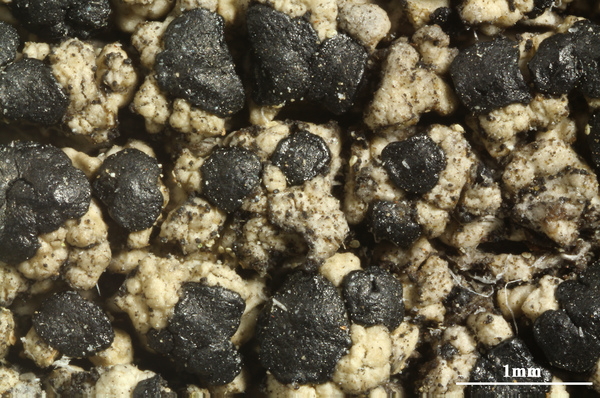
Felix Schumm - CC BY-SA4.0
[20924], Austria, Salzburg, Eastern Alps, Lower Tauern, Lungau Region, 8.3 km NE of Tamsweg, Überling-Sonnseite, Überlingmoos, 47°10'05'' N, 13°54'15'' E, 1725 m, on wooden shingles made of Larix decidua. Leg. R. Türk (no 39669), 3.07.2006, det.R. Türk. LICHENOTHECA GRAECENSIS NR. 476
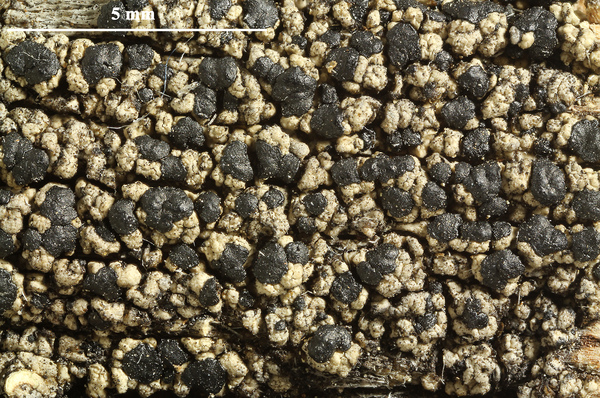
Felix Schumm - CC BY-SA4.0
[20924], Austria, Salzburg, Eastern Alps, Lower Tauern, Lungau Region, 8.3 km NE of Tamsweg, Überling-Sonnseite, Überlingmoos, 47°10'05'' N, 13°54'15'' E, 1725 m, on wooden shingles made of Larix decidua. Leg. R. Türk (no 39669), 3.07.2006, det.R. Türk. LICHENOTHECA GRAECENSIS NR. 476
Growth form: Crustose
Substrata: lignum
Photobiont: green algae other than Trentepohlia
Reproductive strategy: mainly sexual
Commonnes-rarity: (info)
Alpine belt: absent
Subalpine belt: very rare
Montane belt: extremely rare
Dry submediterranean belt: absent
Humid submediterranean belt: absent
Padanian area: absent
pH of the substrata:
| 1 | 2 | 3 | 4 | 5 |
Solar irradiation:
| 1 | 2 | 3 | 4 | 5 |
Aridity:
| 1 | 2 | 3 | 4 | 5 |
Eutrophication:
| 1 | 2 | 3 | 4 | 5 |
Poleotolerance:
| 0 | 1 | 2 | 3 |
Altitudinal distribution:
| 1 | 2 | 3 | 4 | 5 | 6 |
Rarity
absent
extremely rare
very rare
rare
rather rare
rather common
common
very common
extremely common
Loading data...
Occurrence data
Predictive map

Felix Schumm - CC BY-SA4.0
[20924], Austria, Salzburg, Eastern Alps, Lower Tauern, Lungau Region, 8.3 km NE of Tamsweg, Überling-Sonnseite, Überlingmoos, 47°10'05'' N, 13°54'15'' E, 1725 m, on wooden shingles made of Larix decidua. Leg. R. Türk (no 39669), 3.07.2006, det.R. Türk. LICHENOTHECA GRAECENSIS NR. 476



